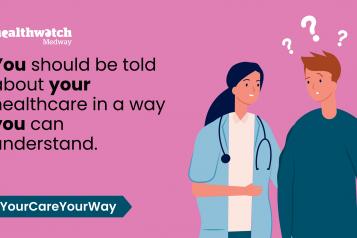Stammer is one of the biggest challenges in accessing healthcare services.

One of the biggest challenges they face is booking and attending appointments via telephone. A survey showed 68% of GP surgeries use phone only booking systems which the survey showed people with stammers have difficulties in using. 41% of people with stammers reported they find it very difficult to use telephone booking, this is nearly double the 23% without a stammer who reported the same issue. An even more concerning statistic is that the survey showed 54% of people with a stammer have suffered mental distress when having to book appointments via a telephone call. The survey found evidence of suffers being hung up on, laughed at, rushed, misunderstood, or just not granted enough time to explain what they were calling for. Respondents stated that sometimes this caused them to delay or never book appointments leading to consequences for their health. They were testimonies of patients fearing their stammer would be misdiagnosed as a side effect of their medication causing that to be withdrawn from them.
The report goes on to suggest 3 improvements to improve the care for people with stammers:
-
Flexibility in how to book an appointment- this would also be helpful for those with other disabilities such as those from the D/deaf community.
-
Training for receptionists in dealing with those with stammers.
-
Introducing a flag system on patient records which would tell receptionist’s if the caller had a stammer.
Other suggestions include using WhatsApp, adapting any voice recognition software to accommodate delayed speech, having an Alternative ID procedure, having set times for call backs which are kept to and using text to speech software.
They recommend that information on accessibility is publicly available, and that staff are trained to not interrupt, mistake for something else or hang up but are trained to wait, focus on the content, and make space for someone who stammers.
There also provide a template script for answering phone calls from people who stammer particularly as stammers are sometimes worse at the start of a phone call.
The report was conducted this year so takes the post Covid 19 system into full consideration and paints a rather negative picture of the situation.
It is possible the denial of treatment could breach the Equality Act 2010 and other Disability discrimination legislation.
Earlier this year research conducted by Healthwatch Kent and Healthwatch Medway set up a campaign to help patients get more information about their health and the care being given to them, in more accessible formats. The campaign is called Your Care, Your Way.
It is based on maximising the effectiveness of the Accessible Information Standard. This standard, introduced in 2016, means whose who have a disability, impairment or sensors loss or are the carer/s or parent/s of someone who does have a legal right for information to be given in a form and manner that can be understood. This may include providing it in a variety of different manners such as large print, easy read, Braille, in audio form or via a filmed sign language video.
The standard also obliges healthcare workers to ask all patents and their parent/s and carer/s if there have any communication needs and how those can be helped by the standard.
It also requires these needs to be placed in a patient's medical record so that all other staff accessing the record in the future are immediately made aware of the needs and how to meet them.
As well as the above it also facilitates the sharing of this information to other care services if permission is granted - no permission, no sharing.
But the main function of the Accessible Information Standard remains the improvement in communication to allow those who can’t access information in the mainstream way get support in the way that suits their needs.
The AIS allows for things like BSL Interpreter at appointments and support in using a hearing aid.
It applies for all healthcare services such as dentist, doctor, care home and opticians.
Read our full report here
STAMMA, the UK’s national charity for people who stammer and the have published the recent finding here
Resource: Stamma.co.uk


